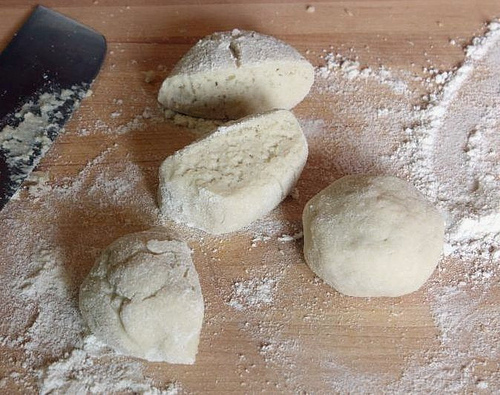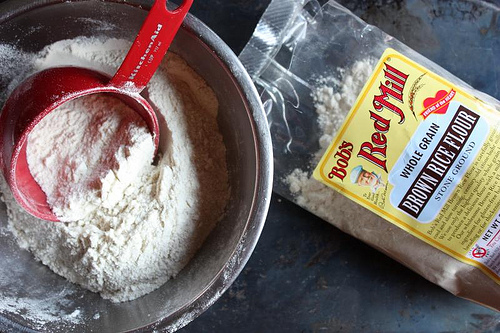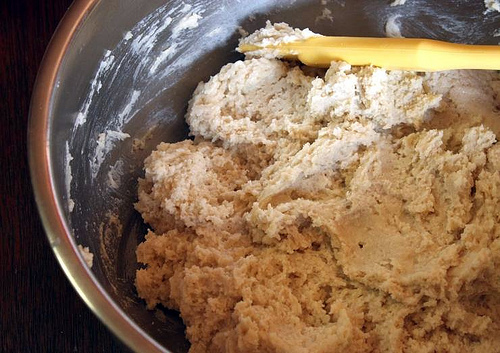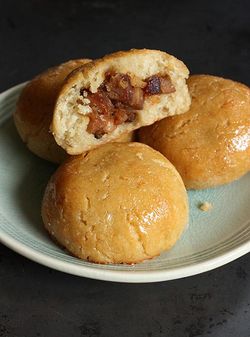
It started last week with an email from a gluten-free Asian dumpling lover who asked about Indonesian buns (bao) made of rice flour dough. Then there was a tweet from @chubbybuns_shop in Boise, Idado, asking if I’d ever made gluten-free bao. I have poked and held enough loaves of gluten-free breads to know that it would be a challenge to create fluffy, chewy dough that could be baked and steamed.
Marvin of Burnt Lumpia asked if I knew how to make Filipino rice flour siopao (stuffed bao). No I didn’t but figured that the Filipinos may mix rice flour with other flours. Given the Filipino- style bao, I figured that I could come up with something. I wasn’t a fool for taking on the challenge of creating gluten-free bao dough.
I looked through several gluten-free sources and decided to base the dough recipe on a cinnamon roll dough from Cybele Pascal’s reliable Allergen-Free Baker’s Handbook. I chose it because it had similar elements as my regular bao dough in Asian Dumplings: flour, fat, sugar, liquid, and leavening. It wasn’t such a big leap, going from Western cinnamon rolls to stuffed Asian buns.
Pascal’s foundation of the gluten-free dough is combination of brown rice flour, tapioca starch, and potato starch. I bought Bob’s Red Mill on her recommendation since Authentic Foods and Ener-G brands were not available at my local health food store; stay away from grainy brown rice flour such as Arrowhead Mills, she says.

The tapioca and potato flour brands are not as important. Then there’s the requisite xantham gum for texture. A double dose of leavening came in the form of baking powder and rapid-rise yeast.
I went two rounds with the dough and made these discoveries:
- You can’t just sub gluten-free flour for regular flour. I tried that the first time around and the dough was overly firm and baked up as little rocks. The gluten-free bao dough below has its own personality.
- Gluten-free bao dough needs extra moisture. The starches and rice flour are liquid suckers and dry up much easier than wheat flour if there’s not enough moisture. The dough is super soft like that of a gooey cookie dough.
- The result is pleasant, though not lofty and fluffy. Expect a nice chew and crumb – like a cross between a scone and a yeasted roll.
- More sugar and salt. For good flavor, I had to up the sugar and add salt. Most Asian dumpling doughs do not contain salt.
- No initial rise is needed. It’s just one long rise after you shape the buns.
- Cooking time is longer for the gluten-free bao dough. Plan on doubling the amount of time it takes to cook the gluten-free bao dough as it’s fairly moist.
I tested out the dough with a char siu pork filling for baked buns and steamed buns. The flavors and textures were good and very serviceable, i.e., I would serve them to gluten-free guests.
Gluten-free bao is not like what you get at dim sum but they do have a rustic appeal of their own. If you follow a gluten-free diet, I hope this satisfies your Chinese bao cravings. If you do not, this is a recipe that helps you better understand flours, starches, and dough. It was a cool experiment.
I’m structuring this trilogy of posts like the recipes in Asian Dumplings. Below is the recipe for the dough, linked to instructions for how to make gluten-free steamed buns and baked buns. Start here and then go to the other recipes!
RECIPE
Gluten-Free Bun Dough
This gluten-free bao dough works for both cooking methods. It’s an allergen-free approach.
Enough dough for 16 (2 ½-inch) buns
10 ounces (2 cups) brown rice flour
4 ounces (⅔ cup) potato starch
1 ½ ounces (⅓ cup) tapioca starch
½ teaspoon xantham gum
2 teaspoons baking powder
½ teaspoon salt
A ¼-ounce package rapid-rise yeast
1 cup unsweetened soy or rice milk
¼ cup canola oil
3 to 4 tablespoons sugar
1. Put the rice flour, potato starch, tapioca starch in a plastic zip-top bag. Shake it all up to make a gluten-free flour mixture. You’ll have nearly 1 pound total. Measure out 11 ¼ ounces (2 ¼ cups) and transfer to a bowl. Set aside another ¼ cup to use later and save the remaining flour for another use.
Add the xantham gum, baking powder, salt, and yeast to the 2 ¼ cups of flour. Whisk to combine.
2. In a small saucepan over medium heat, warm the milk, oil, and sugar, stirring until melted and warm, about 1 minute.
3. Make a well in the middle of the flour mixture, pour in the warm liquid mixture, then stir to combine well. The dough will be soft and ragged, like cookie dough.

Cover tightly with plastic wrap and set aside for 10 minutes, while it firms up slightly. The plastic may steam a bit. The dough is now ready to use for baked or steamed buns.
Make sure you have the filling prepared before making this dough because it comes together quickly. Now choose between baked and steamed buns:
Related Posts:
- Gluten-Free Pot Stickers: Recipe Trial & Dough 3 (sorghum, sweet rice, and tapioca starch dough)
- Gluten-Free Pot Stickers: Recipe Trial & Dough 2 (millet, sorghum, tapioca, and potato dough; includes tips on working with GF dumpling dough)
- Gluten-free Pot Stickers: Recipe Trial 1 (on Asiandumplingtips.com)
- Guide to Building an Asian Dumpling Pantry
- Tolerance Test: Are Gluten-Free Asian Ingredients for You?


















Tessa Domestic Diva says
you have made my day...on the menu again for this week, the first in over a year: baked buns!! Of course the steamed ones will quickly follow, can't wait! Thank you Andrea!
Maria Johnson says
16 buns is just enough for family weekend lunch. Bookmarked page, hope I'll wont't mess the recipe 🙂
Andrea Nguyen says
Wow--so delighted that this interests and benefits you. You can tinker with fillings and dough. Enjoy!
Jill says
Thanks for experimenting with different recipes so we won't have to, Andrea. Can't wait to try this. Part of me wishes you'd show us the finished buns and the texture, though, so we know what to expect. 🙁
Andrea Nguyen says
Jill, the finished textures are displayed in the photos on the baked and steamed bun recipes. They're two different textures. To clarify, I just tweaked the post.
Suzanne Rampton says
Andrea -- you are so cool to create these GF versions of both the buns and pot stickers!
Nike Shox shoes says
I'm partial to her "Papa Noel" myself...
http://www.youtube.com/watch?v=C7B6IfPlDMg
Aquaponics Made Easy says
I’m very pleased to have found this website. Definitely enjoyed reading and I have bookmarked to check out new stuff that you post.
Sophie says
In my favorite book "gluten-free baking" from the culinary institute of america, they substitute normal water with sparkling water to help "add leavening power to GF breads". I have found it works wonders for GF baguette. Might be worth a try for the Baozi...
Fencing Accessories says
Looking really very delicious. I can't wait for final output truly fabulous.
reggiedee says
Hooray!!!! Red bean and taro buns for ME!
monster beats says
I am impressed by the quality of information on this website.There are a lot of good resoures here .I am sure i will visit this place again soon
Mr. Cooking Grill says
yummy! this must be appreciated by all!
marlon says
I have found it works wonders for GF baguette. Might be worth a try for the Baozi..
Nickle says
Great recipe! and i love it.. want to try it at home 🙂
Carlov1963 says
Thanks for being the guinea pig and doing the work for us! I cannot wait to try these. I've been eating gluten-free for a year, but so many recipes substitute white rice flour and other high glycemic starches, which I'm also trying to avoid. The brown rice is a step towards that. Thanks!
Jani_tng says
I just discovered this post on Pinterest and I am so happy to finally find a recipe that is simple and flexible, and with adequate explanations to help novice cooks like me understand what I will be doing. The buns turn out good looking and delicious, and the texture is as close to wheat dough as you can get. It has a nice chew and springy enough to provide what I miss about wheat dough. I shaped these into burger buns to eat with my vegan patties for I have yet to find a healthy char sui recipe that is vegan and GF to make Bao. That’s my hint to encourage you to take up the challenge. Lol. Thank you so much for taking time to create this.
Andrea Nguyen says
I love this, Jani! You rock on how you use the buns for your regular veggie patties. Thanks for trying out the recipe and sharing your experience. Keep on cooking!